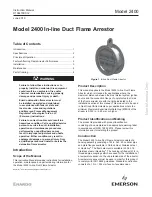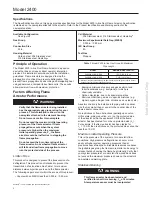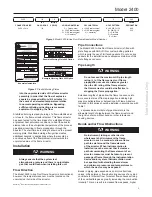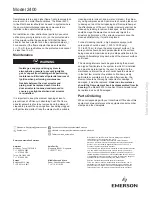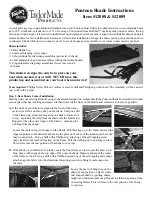
Model 2400
Facebook.com/EmersonAutomationSolutions
LinkedIn.com/company/emerson-automation-solutions
Twitter.com/emr_automation
North America
Only
Emerson Automation Solutions
Americas
McKinney, Texas 75070 USA
T +1 800 558 5853
+1 972 548 3574
Tulsa, OK 74146 USA
T +1 918 662 6161
Europe
Bologna 40013, Italy
T +39 051 419 0611
Asia Pacific
Singapore 128461, Singapore
T +65 6777 8211
Middle East and Africa
Dubai, United Arab Emirates
T +971 4 811 8100
flame temperatures, and higher flame front pressures than
would occur in normal flow conditions. The Model 2400
In-line Duct Arrestor should not be used in systems where
these or similar turbulence inducing components are
installed in the unprotected side piping.
No restrictions or flow obstructions (partially open valve,
orifice plate, piping reduction, etc.) on the protected side
of the arrestor within the equivalent L/D that the flame
arrestor has been tested for on the unprotected side (L
u
).
For example, if the flame arrestor has been tested for
L
u
= 10 L/D, then restrictions on the protected side cannot
be less than 10 L/D.
Maintenance
!
WARNING
Isolate gas supply and bring system to
atmospheric pressure to prevent ignitable
gas or vapors from flashing while performing
maintenance. Eliminate all potential sources of
ignition when performing maintenance.
Gaskets between the duct arrestor and
piping must be replaced each time the
duct arrestor is loosened and removed to
ensure a gas tight seal when duct arrestor
is reinstalled.
It is important to keep the element openings clean to
prevent loss of efficiency in absorbing heat. The flame
arrestor assembly should be removed and the element
cleaned to prevent the openings from becoming clogged
with particulate matter. Clean the element with a suitable
cleaning media (solvent, soap, water, or steam) then blow
dry using compressed air. Special care should be taken not
to damage or dent the cell openings as this would hamper
the effectiveness of the unit. Arrestor elements shall not be
cleaned by rodding to remove blockages, as this practice
could damage the elements and seriously impair the
arrestor’s performance. If the arrestor element cannot be
cleaned satisfactorily, it must be replaced.
For best cleaning results, a high pressure sprayer with
spray wand should be used (1,500 to 3,000 psig /
103 to 207 bar ) to clean the entire element surface. The
spray nozzle should be held perpendicular to the surface
being cleaned to maximize spray media penetration into the
element. Alternately spray each side of the element surface
until clean.
The cleaning interval should be governed by the amount
and type of particulate in the system to which it is installed
and must be determined by the user. To determine the
maintenance interval the user should check the element
in the first few months of operation to find how quickly
particulate accumulates in the cells. After cleaning, the
element should be thoroughly inspected for damage. If
damaged, it must be replaced.
Under no circumstance
should the flame element bank be disassembled from its
housing.
The Model 2400 In-line Duct Flame Arrestor must
be replaced as a unit if damaged.
Parts Ordering
When corresponding with your local Sales Office about this
equipment, always reference the equipment serial number
stamped on the nameplate.
D104470X012 © 2019 Emerson Process Management Regulator
Technologies, Inc. All rights reserved. 06/19.
The Emerson logo is a trademark and service mark of Emerson
Electric Co. All other marks are the property of their prospective owners.
Enardo™ is a mark owned by Regulator Technologies Tulsa, LLC, a
business of Emerson Automation Solutions.
The contents of this publication are presented for informational purposes
only, and while every effort has been made to ensure their accuracy,
they are not to be construed as warranties or guarantees, express or
implied, regarding the products or services described herein or their use
or applicability. We reserve the right to modify or improve the designs or
specifications of such products at any time without notice.
Emerson Process Management Regulator Technologies
Tulsa, LLC does not assume responsibility for the selection, use or
maintenance of any product. Responsibility for proper selection, use
and maintenance of any Emerson Process Management Regulator
Technologies Tulsa, LLC product remains solely with the purchaser.

